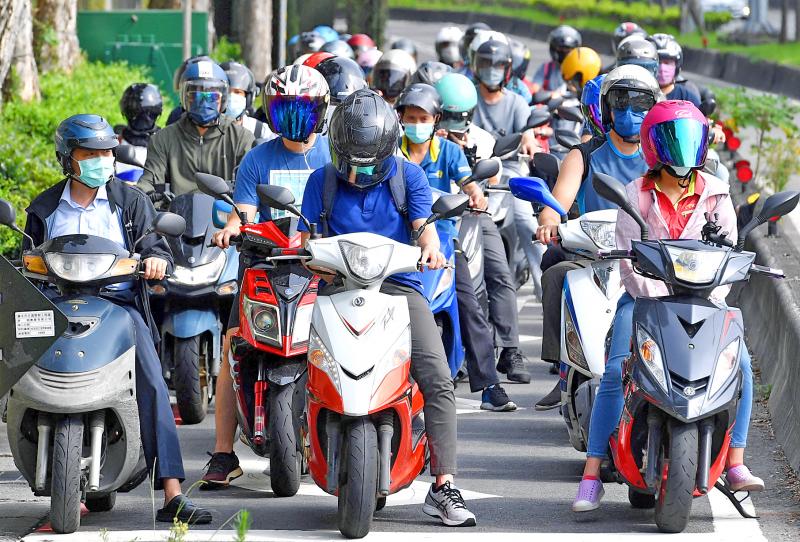The production value of Taiwan’s motorcycles and motorcycle spare parts in the first quarter of this year continued to grow, after hitting record highs in 2019 and last year, the Ministry of Economic Affairs said yesterday.
In the first quarter, output value reached NT$35.6 billion (US$1.29 billion), up 16 percent annually, due mainly to robust exports of gasoline-powered motorcycles and electric scooters, the ministry said in a report.
The motorcycle and spare parts industry’s output value reached record highs of NT$122 billion and NT$132.4 billion in 2019 and last year respectively, ministry data showed.

Photo: CNA
From 2012 to last year, production value grew by an average annual rate of 5.2 percent.
The main products in the industry were gasoline-powered motorcycles and scooters, followed by spare parts, e-bicycles and e-scooters, the report said, adding that production of emission-free e-scooters rose rapidly due to growing environmental consciousness and the rise of athleisure trends.
In the first quarter, the production value of gasoline-powered motorcycles and scooters rose 27.8 percent year-on-year, while that of e-scooters grew 29.8 percent, the largest growth among all product categories, the report showed.
However, sales of e-scooters plunged 60.8 percent year-on-year in the first quarter due to falling international oil prices and reduced government subsidies for purchases of e-scooters, it said.
Japan was the No. 1 destination for Taiwan’s motorcycle and spare parts exports before 2013, whereas from 2014 to 2018, the exports mainly went to the US, data compiled by the Ministry of Finance showed.
In the past few years, Taiwan’s motorcycle and spare parts have mainly gone to the Netherlands, the data showed.
Exports of motorcycle and spare parts to the Netherlands last year reached US$480 million, up 29.8 percent from a year earlier, while its exports to the US were about US$400 million, up 20.7 percent year-on-year, the data showed.

‘SWASTICAR’: Tesla CEO Elon Musk’s close association with Donald Trump has prompted opponents to brand him a ‘Nazi’ and resulted in a dramatic drop in sales Demonstrators descended on Tesla Inc dealerships across the US, and in Europe and Canada on Saturday to protest company chief Elon Musk, who has amassed extraordinary power as a top adviser to US President Donald Trump. Waving signs with messages such as “Musk is stealing our money” and “Reclaim our country,” the protests largely took place peacefully following fiery episodes of vandalism on Tesla vehicles, dealerships and other facilities in recent weeks that US officials have denounced as terrorism. Hundreds rallied on Saturday outside the Tesla dealership in Manhattan. Some blasted Musk, the world’s richest man, while others demanded the shuttering of his

ADVERSARIES: The new list includes 11 entities in China and one in Taiwan, which is a local branch of Chinese cloud computing firm Inspur Group The US added dozens of entities to a trade blacklist on Tuesday, the US Department of Commerce said, in part to disrupt Beijing’s artificial intelligence (AI) and advanced computing capabilities. The action affects 80 entities from countries including China, the United Arab Emirates and Iran, with the commerce department citing their “activities contrary to US national security and foreign policy.” Those added to the “entity list” are restricted from obtaining US items and technologies without government authorization. “We will not allow adversaries to exploit American technology to bolster their own militaries and threaten American lives,” US Secretary of Commerce Howard Lutnick said. The entities

Minister of Finance Chuang Tsui-yun (莊翠雲) yesterday told lawmakers that she “would not speculate,” but a “response plan” has been prepared in case Taiwan is targeted by US President Donald Trump’s reciprocal tariffs, which are to be announced on Wednesday next week. The Trump administration, including US Secretary of the Treasury Scott Bessent, has said that much of the proposed reciprocal tariffs would focus on the 15 countries that have the highest trade surpluses with the US. Bessent has referred to those countries as the “dirty 15,” but has not named them. Last year, Taiwan’s US$73.9 billion trade surplus with the US

Prices of gasoline and diesel products at domestic gas stations are to fall NT$0.2 and NT$0.1 per liter respectively this week, even though international crude oil prices rose last week, CPC Corp, Taiwan (台灣中油) and Formosa Petrochemical Corp (台塑石化) said yesterday. International crude oil prices continued rising last week, as the US Energy Information Administration reported a larger-than-expected drop in US commercial crude oil inventories, CPC said in a statement. Based on the company’s floating oil price formula, the cost of crude oil rose 2.38 percent last week from a week earlier, it said. News that US President Donald Trump plans a “secondary